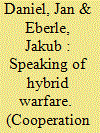|
|
|
Sort Order |
|
|
|
Items / Page
|
|
|
|
|
|
|
| Srl | Item |
| 1 |
ID:
159879


|
|
|
|
|
| Summary/Abstract |
The concept of Central Europe emerges from the tension between the aspiration for a Western identity and the failure to achieve it. This article analyzes The Glass Room, a novel by the British author Simon Mawer set in Brno, Czech Republic, as an artefact that sheds light on the affective dimension of this tension, as captured in the way the book speaks to the Central European desire for “Westernness.” Adopting a Lacanian perspective, I argue that The Glass Room functions as a geopolitical fantasy, bringing its Czech audiences the promise that the desired Western identity is within reach. However, this promise can never be fulfilled, since the substance of “Westernness” is too elusive to ever be possessed and is always dependent on the recognition of a Western audience. This oscillation between desire and its disappointment leads to the self-defeating politics of superiority/inferiority, which is so often seen in the region. The article makes a broader contribution by showing how desire sustains and reproduces particular conceptions of space and what role pop-culture plays in this process. In this argument, the reproduction of a geopolitical imagination depends on its ability to capture subjects’ desire for a full and stable identity.
|
|
|
|
|
|
|
|
|
|
|
|
|
|
|
|
| 2 |
ID:
171779


|
|
|
|
|
| Summary/Abstract |
The article analyzes Germany's policies toward Russia from an ontological security perspective. We argue that foreign policy should be seen as a tool that allows states to maintain a sense of a reasonably stable self, which enables them to cope in the changing world. We develop a three-layered model conceptualizing ontological security through narratives about the self, a significant other, and the international system and show its particular relevance for explicating policy change. When threatened by a crisis, states respond by narrative adjustment that highlights continuity on some levels, while enabling change on other levels. Developing the argument that Germany's ontological security is based in the “civilian power” narrative, we use our model to reconstruct Germany's response to Russia's wars in Georgia and Ukraine. In both cases, the discourse highlighted the ongoing validity of civilian power on the level of the international order, while challenges were accommodated by adjustments on the level of the self and the significant other. Ontological security was restored vis-à-vis the changing world by reinforcing the civilian power as a norm, while shifting blame to either both Germany and Russia (2008), or Russia exclusively (2014), for not adhering to it at a given time.
|
|
|
|
|
|
|
|
|
|
|
|
|
|
|
|
| 3 |
ID:
182617


|
|
|
|
|
| Summary/Abstract |
What do we speak of when we speak of ‘hybrid warfare’, a notion that has become prominent in discussions of European security? The article shows that this question is difficult to answer, as the hybrid warfare discourse is not only vague, but also consists of multiple, and at times contradictory, narratives. While talking and writing about supposedly the same thing, participants in the hybrid warfare debate often suggest markedly different ideas about the precise nature and target of the threat, offer different responses and draw upon different expertise. Grounding our argument in critical scholarship on narratives, security knowledge and hybrid warfare, we build a framework for studying security narratives around the four elements of threat, threatened value, response and underlying knowledge. This framework is utilised in a case study of Czechia, a country that has played a pioneering and outsized role in European hybrid warfare debates. We identify three narratives of hybrid warfare – defence, counterinfluence and education – which present markedly different understandings of ‘hybrid warfare’, and ways to defend against it. Our intervention hopes to contribute to disentangling the contradictions of the hybrid warfare discourse, itself a necessary precondition for both sound state policy and an informed public debate.
|
|
|
|
|
|
|
|
|
|
|
|
|
|
|
|
|
|
|
|
|